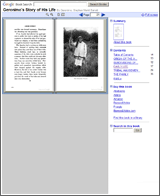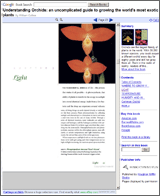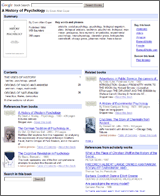9:39 AM
Posted by Theresa Rij, Book Search Support TeamWe get email, lots and lots of email. And we love it all. It's especially exciting when we receive an email that tells a story about a time in someone's life when finding the right book has such a positive impact, the person is moved to write to us. Like this email, sent from a hard-working grad student: As a graduate student working on some pretty heavy duty research, I think Google Book Search rocks. Thank you, thank you, thank you. On multiple occasions, I've discovered just enough information here to get the titles, which then propels me to the library where (much of the time, fortunately), I can get the whole text. Case in point: I'm researching marital and sexual attitudes in 17th century England. I type in "shakespeare marriage" and, wham, up pops B. J. Sokol's Shakespeare, Law, and Marriage from Cambridge University Press, 2003. It's *perfect.* Would I have found it without Google Book Search? Perhaps. But I also might have found it much later, and not allowed it to have the impact in my thinking and research it now does. Did Cambridge UP lose a sale? Um, no. I'm a grad student: I live in the freaking library. But they did gain another reference, and a someday sale when I get a tenure track position (fingers crossed). Additionally, they get heaps of good will because I know that they care about getting their catalog into circulation as conveniently as possible. That makes them cool. This has helped me discover information hidden where I otherwise would never find it. Thank you, thank you, thank you. It's wonderful to hear that we're helping bring great books and people together, and as our index grows, we hope this kind of connection will happen more and more. If you've had a similar experience, we invite you to share it with us.
Permalink | Links to this post |
3:56 PM
Posted by Rie Hirabaru, Associate Marketing ManagerNovels are like fingerprints: they may share the same basic pattern, but each one is unique – especially if you consider the infinite variety of ways they can affect people. I'm a huge fan of Paul Auster, so whenever I meet someone who’s similarly enthralled, I always want to dig deeper. One of the first questions I ask is how they discovered him. I first heard about Auster through a friend of mine, and fell in love with his books after reading City of Glass, a detective story that brilliantly subverts the genre. It was unlike any other book I'd ever read, and I remember finishing it in a single day. Five years later, I've plowed through almost all of Auster's books, so I was excited to see them begin to appear in Google Book Search. I was even more excited when I realized I could use the index to explore his connections to other writers. Case in point: I plugged in the search terms "Paul Auster," "City of Glass" and "crime," and found a book identifying Raymond Chandler as a writer likely to have influenced him. It turns out Chandler wrote canonical detective stories in the '30s and '40s – the kind where the hero gets a phone call in the middle of the night from a mysterious stranger, who just happens to supply the single vital clue that solves the crime. That's exactly what takes place in City of Glass, except there's a metaphysical twist – the hero is a mystery writer, and the stranger on the other end of the line says he's looking for Paul Auster of the Auster Detective Agency. It's inspiring to imagine that as we continue to build the Google Book Search index, more people will be able to unravel mysteries – identifying patterns and connections not only in literature, but every subject that spurs our curiosity.
Permalink | Links to this post |
3:46 PM
Posted by Arielle Reinstein, Associate Product Marketing ManagerWe’re always excited to hear about creative new ways authors and publishers are connecting with readers. NPR ran a story yesterday about how publishers like HarperCollins and Mira Books are creating live-action book trailers, showing these previews online and in movie theaters -- especially theaters located near bookstores. And a recent Wall Street Journal article (subscription required) describes how some fiction publishers are borrowing strategies from non-fiction marketing to reach niche audiences. For instance, Ballantine Books distributed gift bags containing copies of James Swain thrillers -- which are set in casinos -- to hundreds of people at the World Gaming Protection Conference. Jennifer Chiaverini, author of the Elm Creek Quilts series, appeared on a cable TV quilting show to talk about patterns and her latest release. But she didn't stop with television -- she also created a website where she blogs about quilting, shares information about her books, publishes a schedule of her appearances and more. Chiaverini isn't alone. So many people are talking about books online, there are sites like the LitBlog Co-Op, which aims to unite leading literary weblogs "for the purpose of drawing attention to the best of contemporary fiction, authors and presses that are struggling to be noticed in a flooded marketplace." MySpace, the popular social networking site, isn't only for teenagers or musicians. Reuters and PW Daily have profiled four memoirists who created The Memoirists Collective page, where the authors hold contests offering readers the chance to get their own memoirs published. As of today, the group has more than 1,000 friends. Now MySpace has a special section dedicated to books, authors and reading groups. For some -- like author Cory Doctorow, who co-edits the BoingBoing blog, makes his books freely available online with Creative Commons licenses and podcasts installments of his stories -- connecting with readers online may already be second nature. But for others, it's something they're just beginning to tackle. Of course, we at Google hope that everyone who wants to help readers find their books online has a marketing plan that includes making the books discoverable through Google Book Search.
Permalink | Links to this post |
9:48 AM
Posted by Arielle Reinstein, Associate Product Marketing ManagerSince this blog began, we've been using an atom feed as the main way for people to subscribe to Inside Google Book Search. A few of you (like Eoin Purcell) have mentioned that you're reading our posts this way. Now, for those of you who prefer email to feed readers, you can start receiving new Inside Google Book Search posts in your inbox. This mailing list is powered by Google Groups, so you can unsubscribe or change your membership options at any time. And of course, you can always visit us online, right here at http://booksearch.blogspot.com.
Permalink | Links to this post |
3:39 PM
Posted by Ben Bunnell, Library Partnership TeamOne of the best parts of being on the Google Book Search team is hearing from people who have discovered books that create unexpected personal connections. One of these stories was emailed to us by a man named Bernie Robichau. Like many people, Bernie experimented with Book Search by doing a search on his last name. As he was browsing the second page of results, he came across Plymouth Labor and Leisure. Clicking on this title brought him to page 32, which contained a photo of his great uncle Earl from the Plymouth Cordage Baseball team, circa 1914. Bernie bought a couple copies of the book and gave one to his housebound father, who had spent a lot of time in Plymouth as a child. The photo brought back recollections from years past. Bernie writes: Never before could I have found such an obscure and wonderful gem... I sat for long periods of time over Thanksgiving listening to my father recount memories triggered by Mr. Baker's book. Google, along with the publishing company, brought some unexpected happiness to someone who really needed it. As we continue adding books to Google Book Search, it's my hope and belief that more and more connections like this will occur between people and their past. For more stories like this one, check out this article from our last Librarian Newsletter.
Permalink | Links to this post |
9:58 AM
Posted by Roland Lange, Strategic Partner Development Manager, Book Search'Charlotte is the best storyteller I ever heard,' said Fern, poking her dish towel into her cereal bowl.
'Fern,' said her mother sternly, 'you must not invent things. You know spiders don't tell stories. Spiders can't talk.'
'Charlotte can,' said Fern. Did you cry at the end of Charlotte's Web? You can admit it...more than a few of us did. Having just read it to my kids, I found the ending no less moving than I did back in elementary school. For me, reading about the death of Charlotte, the talking spider, best friend to Wilbur, a pig, was the first time I ever really thought about or understood the concept of life and death. Today is E.B. White's birthday (1899-1985), so we're celebrating the remarkable storyteller who brought to life the spider who teaches us so much. Of course, White isn't only the author of one of the most beloved children's books of our time. He's also a renowned essayist and a giant of the American literary scene, and we're very proud to make many of his works discoverable on Book Search. If you loved Charlotte's Web, but haven't read any other fiction by White, check out The Trumpet of the Swan -- you're in for a treat. For works in the form he's arguably best known for -- essays -- you can browse through Essays of E.B. White. They're crisp and clear, topped with a dollop of wit -- in other words, eminently enjoyable. If you're an E.B. White fan like me and can't get enough, you might also be interested in books that reference his part in the rise of the great New Yorker magazine. Take a look at the biographies not just of the author himself ( E.B. White: A Biography by Scott Elledge), but also of founding editor Harold Ross (James Thurber -- another New Yorker legend -- has an interesting version called The Years with Ross). And of course, feel free to explore on your own -- if you like what you see and want a copy of a book for yourself, the "Buy this Book" links will show you where you can get one.
Permalink | Links to this post |
4:41 PM
Posted by Ryan Sands, Book Search Support TeamOne of the topics we regularly receive questions about is the different ways we display books. For example, João from Portugal asks: I thought that we could read the whole content of books on Google, but I can only read the Table of Contents and a few other pages of this book, then buy the book afterwards. How can I read the entire book? Searching around on Book Search, you'll see that we display books in different ways depending on the specific copyright status of each title. Given the status, we range from making the entire text of public domain books available to showing either small snippets or simply bibliographic details about in-copyright books. For books that authors and publishers have submitted to us, you can see a limited preview of the pages. The four ways you'll see books in Google Book SearchFull View  For books in Full View, you can view the entire book. These include books that we've verified are in the public domain, or those that the publisher or author has decided to make fully browsable. Some examples of materials presented in Full View (in the U.S.) are Charles Sumner's eulogy for Abraham Lincoln from 1865 and a collection of Edgar Allan Poe's stories from 1903. Limited Preview  For books that fall into this category, you can view a limited number of pages. These books have been submitted through our Partner Program by copyright holders in order to enable you to find and browse (and purchase!) their books. A few examples include Lemony Snicket's A Series of Unfortunate Events series, or the late Octavia Butler's powerful novel Kindred. Snippet View  Books that may still be in copyright that we don't receive through the Partner Program are displayed in Snippet View. For these books, you can view a few sentences in addition to bibliographic information. For example, you can view mentions of China in the 1937 report, Japan in Jeopardy, or check out references to man-eating sharks in the 1940's title This Amazing Planet. No Preview Available  For some books -- like dictionaries -- we display only basic information about the books. You're still searching the full text of these books from books.google.com, so you'll be able to figure out if your search term appears anywhere within the book, even if it's not in the title or index. You can find out details about Webster's New World Crossword Puzzle Dictionary or see basic information about this Pocket English-Bengali Dictionary. Our goal is to provide everyone with a good Book Search experience, while at the same time protecting the copyrights of publishers and authors. Some books may start out with no preview or in Snippet View, and later be shown in Limited Preview or Full View as we partner with the copyright owners or confirm that the book is in fact in the public domain. In the meantime, we'll continue to be conservative in our display of the books in Google Book Search. We hope this helps clear up some of the confusion -- we want you to get the most out of Book Search. If you have any additional questions about these different book views, send us a note -- we'll be happy to answer them.
Permalink | Links to this post |
|




